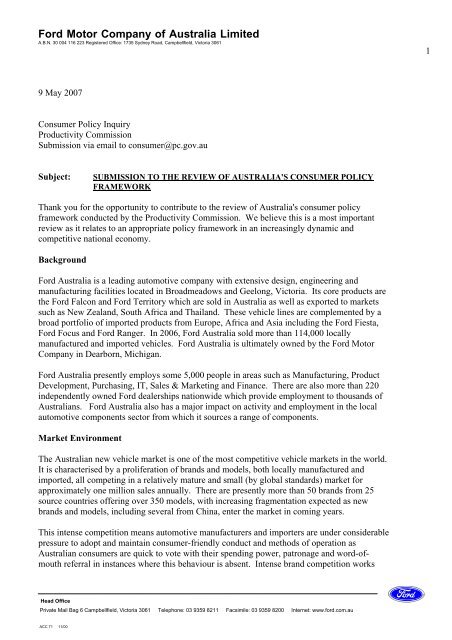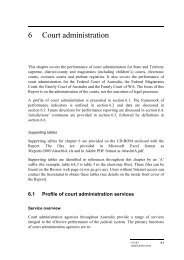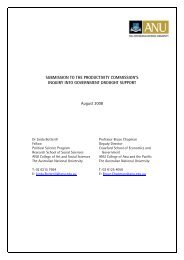Ford Motor Company of Australia Limited - Productivity Commission
Ford Motor Company of Australia Limited - Productivity Commission
Ford Motor Company of Australia Limited - Productivity Commission
You also want an ePaper? Increase the reach of your titles
YUMPU automatically turns print PDFs into web optimized ePapers that Google loves.
<strong>Ford</strong> <strong>Motor</strong> <strong>Company</strong> <strong>of</strong> <strong>Australia</strong> <strong>Limited</strong><br />
A.B.N. 30 004 116 223 Registered Office: 1735 Sydney Road, Campbellfield, Victoria 3061<br />
1<br />
9 May 2007<br />
Consumer Policy Inquiry<br />
<strong>Productivity</strong> <strong>Commission</strong><br />
Submission via email to consumer@pc.gov.au<br />
Subject:<br />
SUBMISSION TO THE REVIEW OF AUSTRALIA'S CONSUMER POLICY<br />
FRAMEWORK<br />
Thank you for the opportunity to contribute to the review <strong>of</strong> <strong>Australia</strong>'s consumer policy<br />
framework conducted by the <strong>Productivity</strong> <strong>Commission</strong>. We believe this is a most important<br />
review as it relates to an appropriate policy framework in an increasingly dynamic and<br />
competitive national economy.<br />
Background<br />
<strong>Ford</strong> <strong>Australia</strong> is a leading automotive company with extensive design, engineering and<br />
manufacturing facilities located in Broadmeadows and Geelong, Victoria. Its core products are<br />
the <strong>Ford</strong> Falcon and <strong>Ford</strong> Territory which are sold in <strong>Australia</strong> as well as exported to markets<br />
such as New Zealand, South Africa and Thailand. These vehicle lines are complemented by a<br />
broad portfolio <strong>of</strong> imported products from Europe, Africa and Asia including the <strong>Ford</strong> Fiesta,<br />
<strong>Ford</strong> Focus and <strong>Ford</strong> Ranger. In 2006, <strong>Ford</strong> <strong>Australia</strong> sold more than 114,000 locally<br />
manufactured and imported vehicles. <strong>Ford</strong> <strong>Australia</strong> is ultimately owned by the <strong>Ford</strong> <strong>Motor</strong><br />
<strong>Company</strong> in Dearborn, Michigan.<br />
<strong>Ford</strong> <strong>Australia</strong> presently employs some 5,000 people in areas such as Manufacturing, Product<br />
Development, Purchasing, IT, Sales & Marketing and Finance. There are also more than 220<br />
independently owned <strong>Ford</strong> dealerships nationwide which provide employment to thousands <strong>of</strong><br />
<strong>Australia</strong>ns. <strong>Ford</strong> <strong>Australia</strong> also has a major impact on activity and employment in the local<br />
automotive components sector from which it sources a range <strong>of</strong> components.<br />
Market Environment<br />
The <strong>Australia</strong>n new vehicle market is one <strong>of</strong> the most competitive vehicle markets in the world.<br />
It is characterised by a proliferation <strong>of</strong> brands and models, both locally manufactured and<br />
imported, all competing in a relatively mature and small (by global standards) market for<br />
approximately one million sales annually. There are presently more than 50 brands from 25<br />
source countries <strong>of</strong>fering over 350 models, with increasing fragmentation expected as new<br />
brands and models, including several from China, enter the market in coming years.<br />
This intense competition means automotive manufacturers and importers are under considerable<br />
pressure to adopt and maintain consumer-friendly conduct and methods <strong>of</strong> operation as<br />
<strong>Australia</strong>n consumers are quick to vote with their spending power, patronage and word-<strong>of</strong>mouth<br />
referral in instances where this behaviour is absent. Intense brand competition works<br />
Head Office<br />
Private Mail Bag 6 Campbellfield, Victoria 3061 Telephone: 03 9359 8211 Facsimile: 03 9359 8200 Internet: www.ford.com.au<br />
ACC 71 11/00
<strong>Ford</strong> <strong>Motor</strong> <strong>Company</strong> <strong>of</strong> <strong>Australia</strong> <strong>Limited</strong><br />
A.B.N. 30 004 116 223 Registered Office: 1735 Sydney Road, Campbellfield, Victoria 3061<br />
favourably to ensure consumers' interests are championed and promoted at all consumer<br />
interactions.<br />
2<br />
Key Issues for Consideration by the Review Committee<br />
A key issue for major national corporations such as <strong>Ford</strong> is that <strong>of</strong> the complexity <strong>of</strong> operating<br />
under a variety <strong>of</strong> state-based regulations in addition to the federal regulations, and the<br />
associated costs <strong>of</strong> compliance. To this end, we would encourage a national consumer policy<br />
framework to ensure both consistency and that the costs <strong>of</strong> compliance are efficiently managed<br />
and minimized. Similarly, the rise <strong>of</strong> internet shopping, with its disregard <strong>of</strong> physical statebased<br />
boundaries, has also necessitated the need for legislative framework at a national level.<br />
We would also stress that any regulatory change to existing consumer policy be based upon<br />
evidence and demonstrable market failure, with due consideration given to the impact or burden<br />
that the proposed changes place on corporations in terms <strong>of</strong> compliance. A rigorous Regulatory<br />
Impact Statement (RIS) must accompany any proposed additional regulatory change, and<br />
ongoing, periodic assessments made on the relative cost/benefit <strong>of</strong> the changes once<br />
implemented to gauge the effectiveness <strong>of</strong> the intervention in meeting its objectives in an<br />
efficient manner.<br />
By its nature, the automotive industry <strong>of</strong>ten operates under specific and unique structures and<br />
consideration must be given to these characteristics when developing more generic consumer<br />
policy change. For example, <strong>Ford</strong> <strong>Motor</strong> <strong>Company</strong> does not sell its products directly to end<br />
consumers. Products are sold to <strong>Ford</strong> dealerships which then sell them to the ultimate<br />
consumers. Proposed legislative change needs to recognise this tiered arrangement <strong>of</strong> selling to<br />
ensure the appropriate relationships and transactions are being affected.<br />
Additionally, intervention may not require imposed regulatory change. In some instances,<br />
industries may, and do, act voluntarily to bring about changed behaviours and outcomes. For<br />
example, the <strong>Australia</strong>n automotive industry observes a voluntary advertising standards code<br />
amongst its members. This practice has resulted in members self-policing advertisements in<br />
accordance with strict guidelines without the need for additional legislation<br />
Conclusion<br />
We would be happy to elaborate on the issues raised in this submission if required. The writer<br />
can be contacted on (03) 9359 8068, or via email ehaug@ford.com.<br />
Yours sincerely<br />
Elly Haug<br />
Government Liaison Manager<br />
Head Office<br />
Private Mail Bag 6 Campbellfield, Victoria 3061 Telephone: 03 9359 8211 Facsimile: 03 9359 8200 Internet: www.ford.com.au<br />
ACC 71 11/00

















